ASHEVILLE — Chances are you’ve seen the pictures on TV, online or in the local paper — swarms of protesters, signs in hand, gathered in the public square or before a government building, mouths open in midscream at some bastion of bureaucratic power.
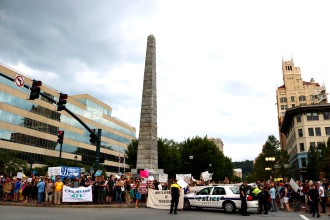
With political tensions running sky high across the United States, movements outside the historical mainstream such as Black Lives Matter, antifa and the tea party have captured national headlines in recent years, drawing praise, provoking criticism and forcing Americans to evaluate their own stances on social issues. While the protests garner national headlines, people seldom see the work these activists engage in behind the scenes.
In Western North Carolina, homegrown activists of all stripes are working to effect change among an increasingly divided populace, drawing on historical ideals and using new technologies to spread their messages.
Xpress reached out to local activists from across the political spectrum to share their motivations, challenges and techniques. While one may not agree with the methods or message, scholars say these activists play an essential role in defining and shaping region’s future.
Behind the bandana
In an Aug. 30 blog post on the Buncombe County GOP website, party Chair Carl Mumpower wrote a diatribe against what he deemed “[t]he left’s fledgling para-military branch – antifa,” equating its motivations and methods with those of the terrorist group ISIS.
Mumpower’s denunciation of antifa activists — short for “anti-fascist” — echoes similar concerns raised by sources as diverse as The Washington Post and President Donald Trump. However, such characterizations often fail to take into account some fundamental aspects of the antifa movement.
“Really, if you oppose fascism, you’re antifa,” says Frida, an Asheville resident who identifies with the movement. “You don’t have antifa membership, meetups or a newspaper. They are primarily made up of different kinds of groups of people.”
Frida spoke with Xpress on the condition that we not use her real name; she says she has been a target of “doxing,” a practice of leaking personal information online as a means of harassment. At the same time, Frida admits she and other antifa activists also engage in doxing to reveal the identities of activists on the far right.
While beliefs and philosophies vary among activists, a core strategy of antifa protesters is denying those who promote fascist ideology a soapbox. “We will show up when there’s a neo-Nazi rally, or when people are using their platform of ‘free speech’ that’s really hate speech advocating for genocide or things that are obviously anti-humanitarian,” Frida explains.
Arguments that antifa activists are as violent as the alt-right demonstrators they oppose aren’t supported by facts, Frida adds. “Both historically and presently, [the far right] have a higher body count,” she says. According to the Anti-Defamation League, between 2007 and 2016, roughly 74 percent of extremist-related murders were attributed to right-wing terrorists, as opposed to about 24 percent committed by Islamic domestic terrorists and 2 percent by left-wing extremists.
Nor is Asheville, despite its touted progressive atmosphere, immune from white supremacist influence, as recent incidents show. Local social media buzzed with speculation and outrage this fall after recruitment flyers for white nationalist group Identity Evropa were found on UNC Asheville’s campus. That came weeks after a flyer advertising a “Unite The Right” rally at the Vance Monument in downtown Asheville on Sept. 2.
While eyewitness reports differ as to the number of alt-right demonstrators who showed up, approximately 50 antifa activists did, Frida says. Several individuals bent on agitating antifa activists were also on hand, she recalls, including an unmarked white SUV whose passengers displayed the Nazi salute through open windows. “Every time they drove past us, three or four arms came out of that vehicle with the Nazi salute, and they had their tags off their car, like they pre-emptively did all of this.”
Less talk, more action
What defines modern-day grassroots activism? For some, movements like antifa and Black Lives Matter represent the natural progression of earlier political movements, says Chris Cooper, a Western Carolina University professor of political science. “Social activists tend to move from one group to the other,” he notes. “Members of yesterday’s Occupy Wall Street may join up with antifa today.”
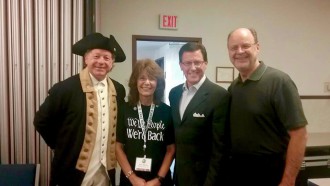
The divisiveness of today’s conventional political climate and frustration with conventional politics can also lead more people to take a vocal activist stance on issues of importance to them, he adds. “Grassroots activists are ones who tend to be frustrated with traditional channels — they want to work directly on policy problems rather than go through intermediaries like lobbyists.”
One key in contemporary movements is the use of social media to communicate directly with the public, says Rima Vesely-Flad, professor of religious studies and social justice at Warren Wilson College. “You can spread messages and shape your own narrative,” Vesely-Flad notes. “I think you don’t have something like [the Ferguson protests] without social media. [It] is the only venue that has allowed worldwide conversation on racism to take place in such a rapid, uncharted way.”
Nor is social media an exclusive tool of the left, says Cooper. “Both left- and right-leaning groups have also been successful pitching a message of avoiding politics as usual.”
The Asheville Tea Party maintains a strong presence on social media platforms to amplify its voice. Formed in 2009, the group regularly uses Twitter to apply pressure to politicians and disseminate information, says Jane Bilello, chair of the Asheville chapter.
“We try and tweet to some of those [politicians] who are not doing what’s supposed to be done and thank those who are,” Bilello says. “These folks up in Washington look at their Twitter accounts a bunch; they want to see what’s going on. And I will tell you, some really don’t like us when we call,” she says with a laugh.
Despite perceptions that the tea party movement has died down, Bilello says many regional chapters are still quite active. In September, her group played a key role in bringing the Rev. Dan Fisher, an Oklahoma gubernatorial candidate, to North Carolina as part of his speaking tour of the Southeast. The Asheville Tea Party has also been pivotal in organizing statewide gatherings, constitutional reading events and regular trips to Washington to ensure its message is heard by politicians.
“I think the reason we’re so successful is because we do things,” Bilello says. “A lot of times, we go to meetings and they become gripe sessions. We don’t do the griping; we say, ‘This is a problem, how we fix it?’ We put one foot in front of the other, do what we do and continue to make a difference.”
Grassroots and guns
A desire to move beyond griping to tangible action motivated Asheville resident Scout to get involved in social activism as well. “I was tired of being stagnant,” says the Pennsylvania native, who joined the Carolina Mountain John Brown Gun Club after moving to West Asheville several months ago. “When I moved down here, I was instantly able to get into something that I really agreed with the praxis of.”
Scout and fellow Carolina Mountain JBGC member Dean also spoke with Xpress on the condition we not use their real names, citing fears of doxing and retaliation as reasons for insisting on anonymity.
Carolina Mountain JBGC, based out of Asheville and Boone, is the local chapter of the national Redneck Revolt network. Among left-leaning activist groups, Redneck Revolt has generated controversy for its embrace of responsible gun culture as a means of self-defense for marginalized communities. An Oct. 20 Fox News article referred to the group as the left’s “gun-toting militia,” a stereotype that local members say misses the ideological forest for the sensationalized trees.
“This is about safety,” says Dean of the group’s embrace of armed community defense. He disputes depictions of the group as violent. “If other communities can have access to weapons, why can’t our oppressed and marginalized communities have the same access and not be considered violent?”
JBGC provides firearms and first-aid training to its members, many of whom come from communities historically excluded from gun culture. “I’m really thankful, because it’s not just a bunch of cis men in our chapter,” says Scout, who identifies as trans. (Cisgender, or cis, is a term describing those who do not identify as transgender.) “My first range day, there was never any chastising or condescending behaviors toward me or any of the femmes or nonbinary folks in our group.”
While the idea of “anarchists with guns” might trouble conventional activists on the left, Dean contends that armed defense is only one facet of Redneck Revolt’s work in the community. JBGC works to strengthen local self-reliance through initiatives like community gardens. The group also hosts educational and strategizing events such as the Sept. 27 “Eye on Charlottesville” forum that looked at lessons from the August white nationalist rally that erupted in violence and left one counterprotester dead.
JBGC hopes to expand its activism into rural white communities to dispel negative perceptions of leftists.
“A lot of times, I think the rural community has just never been talked to by the left, so they don’t really understand where we’re coming from,” says Dean. “Rural white communities have only really been given one option, and I think the idea is to show them that there are other options out there, other than voting red every time.”
As the group benefiting most from traditional power structures, white communities have a prime opportunity to shape the narrative, he adds. “It’s not asking you to be ashamed of your ancestors,” notes Dean, who identifies as a person of color. “I’m asking you to be in the moment and to break down the systems with me, side by side.”
He is also adamant that creating real social change is larger than any one group. “We’re not the face of anti-fascists, we’re just a part of it, and we all have to work,” he says. “Something I think we’re specifically working toward here is bridging connections between multiple groups.”
Negative perceptions
Many activist groups combat negative stereotypes, regardless of their political views. The portrayal of these groups as “fringe” political elements glosses over the historical pedigree of modern-day activism, says Vesely-Flad.
“They’re not fringe groups — they’re legitimately organized, grassroots, community-based groups that mobilize to protest and assert their own agenda,” she notes, drawing parallels to the Protestant Reformation, Revolutionary War, and abolitionist and civil rights movements. “This country was founded on this kind of activism.”
Assertions like Mumpower’s about antifa protesters create a false equivalency about the movement’s goals, says Frida. “It blows my mind a little bit to see such an opposition to the ideology,” she notes. “I personally think it’s really easy to distinguish between hate speech and free speech. Does it advocate for genocide? Does it marginalize people? Has it historically done so? If the answer to all of those questions are yes, then it’s hate speech, and I don’t think there’s room for it.”
While the nebulous, decentralized nature of antifa and other activist movements shields them from attacks from outside adversaries, it can also lead to a few bad apples spoiling the bunch in the realm of public perception, Cooper notes. “Anyone with a sign and a Twitter account can proclaim themselves part of a social movement,” he says. “As a result, there are certainly violent folks in some of these groups, just as there are in any group.” But the idea that these movements are inherently violent “just isn’t backed up by the evidence,” he adds.
Bilello says the Asheville Tea Party has been the target of attacks from both sides of the political divide as well. “When we first got underway, [Republicans] absolutely tarred and feathered us, calling us ‘traitors,’” she says. “Then, of course, we have the other folks that have bought into the line that we’re crazy people that love to run around with guns.”
She also strongly refutes accusations that Tea Party members are part of the alt-right movement or sympathize with white supremacists. “We are not them!” she insists. “We are conservative, sane, sober, law-abiding citizens who go to work, pay our taxes. If a neighbor’s in trouble, we’re right there for them.”
Reaching out
Sometimes, however, negative perceptions can be the catalyst for activism. Andrew Henson of Haywood County says dispelling stereotypes was the main motivation for a Sept. 9 truck rally he organized in response to the heated debate over the symbolic meaning of the Confederate flag. The issue stems from community complaints over the display of Confederate flags during the town of Canton’s annual Labor Day Parade on September 4. Canton aldermen have subsequently debated a policy banning the display of “any image or content that includes nudity, profanity, lewdness, illegal drugs, violence, obscenity, hate, [or] racism” at future public events, according to a Nov. 1 article in the Smoky Mountain News.
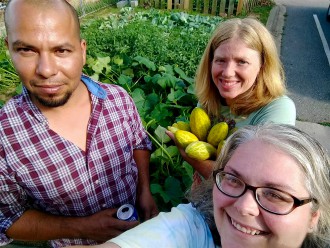
“The reason I did the ride is I wanted everyone to come out — black, gay, everybody — to show that just because somebody flies this flag, they’re not this racist, sexist monster,” he says, adding that the Confederate flag was seen as “a sign of rebellion,” rather than a symbol of racist sentiment, among his community growing up.
Organized through social media in just four days, Henson says the rally quickly exceeded expectations, with an estimated 205 vehicles driving across Haywood County toward Maggie Valley, many of them displaying Confederate flags in support of Southern “heritage.” Despite the strong turnout, Henson admits he was disappointed more diversity in opinion wasn’t represented, despite his efforts to reach out to other local organizations.
“I told them to come out, bring their friends, bring whatever flag or symbol that shows support for your group,” he recalls. “Most of the answers I got were that the only time they’d be anywhere near a Confederate flag is if they’re protesting it. They didn’t even want to give it a chance.”
Despite the cool reception to his entreaties, Henson hopes to have larger, more diverse events in the future, encouraging people of all persuasions and backgrounds to join in. “We can have our differences — you don’t have to agree with everything that we think is right, and we don’t have to agree with everything you think is right — but let’s show that we can communicate,” he says. “Let’s not fight about it, let’s have a discussion.”
While others have asked him about staging a rally in Buncombe County and other locales, Henson says he’s focusing on Haywood County for now. “Haywood is my home,” he says. “I’ve got to try to make a difference here before I can spread out to anywhere else.”
Home is where the heart is
Making one’s community a better place to live is an important tenet for any grassroots organization. But for BeLoved Asheville, it’s a way of life. Taking its name from Martin Luther King Jr.’s idea of a “beloved community,” the group emerged in 2009 out of the desire to develop “an intentional community focused on love and equity made up of people who have been pushed to the streets and margins,” say the members of BeLoved —who asked to be quoted collectively — in an email exchange.
“Often in Asheville our true diversity is hidden, but the community at BeLoved is reflective of our community as it truly is — perhaps the Asheville that many never see,” they say. “What homelessness, poverty, racism and discrimination does to the soul and the body is to say, ‘You don’t belong!’ BeLoved at its heart is a place to create belonging and share life together.”
BeLoved offers its shared space in downtown Asheville for community meetings, provides basic necessities to underprivileged residents and assists in the development of community gardens. The group also runs community initiatives, such as its street medic program, which trains those living on the streets in basic first aid to help address medical crises.
“The protest is how we live every day,” say BeLoved members. “It is the way we love when no one is looking and the way we love when the whole city is looking.”
While BeLoved members say they stay busy, much of their work might not be apparent to the casual eye. “We hear every time we go out to the public square: ‘Get a job!’” group members say. “And yet, we are people working hard every day to make our community better. Our time [spent] in the public square is a fraction compared to the time we are doing street outreach, making sure our elders have fresh healthy food, helping people do their laundry or move off the streets into a new place.”
This is not to say that the group is opposed to public demonstration: on August 18, members of BeLoved were involved in an attempt to remove the Robert E. Lee/Dixie Highway plaque from the monument that sits in front of the Vance obelisk in Pack Square. While the activists attempting to remove the marker were charged with committing damage to real property for the act, these charges were subsequently dismissed by Buncombe County District Attorney Todd Williams in lieu of community service.
Most importantly, say members of BeLoved, “We show up,” whether that be to a community policy hearing, at the local homeless shelter or on the corner of Pack Square to protest injustice. “It is a huge part of our values,” they say.
Be the change
Though the messages and means are varied, the overarching goal shared by local activist groups and individuals is the hope that more people will become actively involved in addressing the issues facing Asheville and communities across WNC.
That starts with looking at oneself and one’s immediate surroundings, says JBGC’s Dean. “If you have that uncle who makes distasteful jokes, confront them; reach out to an organization and see how you can get involved; check your local anarchist bookstore and just to keep an open mind,” he advises. “Even the most open-minded of us is going to have things we need to change; I think that’s important to be able to self-criticize on a personal level.“
Henson, meanwhile, hopes to get more people involved in creating dialogue between residents of all backgrounds and beliefs, and finding common ground amid the myriad differences. “What makes a difference, 15 people or 15,000 people?” he asks rhetorically. “If you have all these people that fly Confederate flags, and then the LGBTQ community and the different Black Lives Matter groups and groups like that — if we all come together and would fight toward one thing, it would make a difference.”
By placing controversial social issues such as white supremacy, racial inequity and government corruption front and center in the public mind, activists are serving as the vanguard of the nation’s political consciousness, says Cooper. “Attention is the most important resource in American politics,” he notes, “and social movements such as the ones we’re seeing will always be important as they draw attention toward the issues they care about.”
It’s the drive to show up in person to advocate for one’s beliefs that make activists the catalysts of change for a community and culture, says Vesely-Flad. “It’s not enough for a conversation to take place through a kind of disembodied media; you have to show up to really show what you’re committed to,” she says. “This is about how communities are formed, who belongs, and who has space in our communities. Who gets to participate.”
Editor’s note: This article has been updated since it appeared in print in Xpress’ Nov. 8 issue to mention BeLoved members’ involvement with the attempted removal of the Robert E. Lee marker in Asheville’s Pack Square. Efforts to reach out to Asheville activists with the local Black Lives Matter movement, as well as local chapters of the III Percenters movement were not successful as of publication.



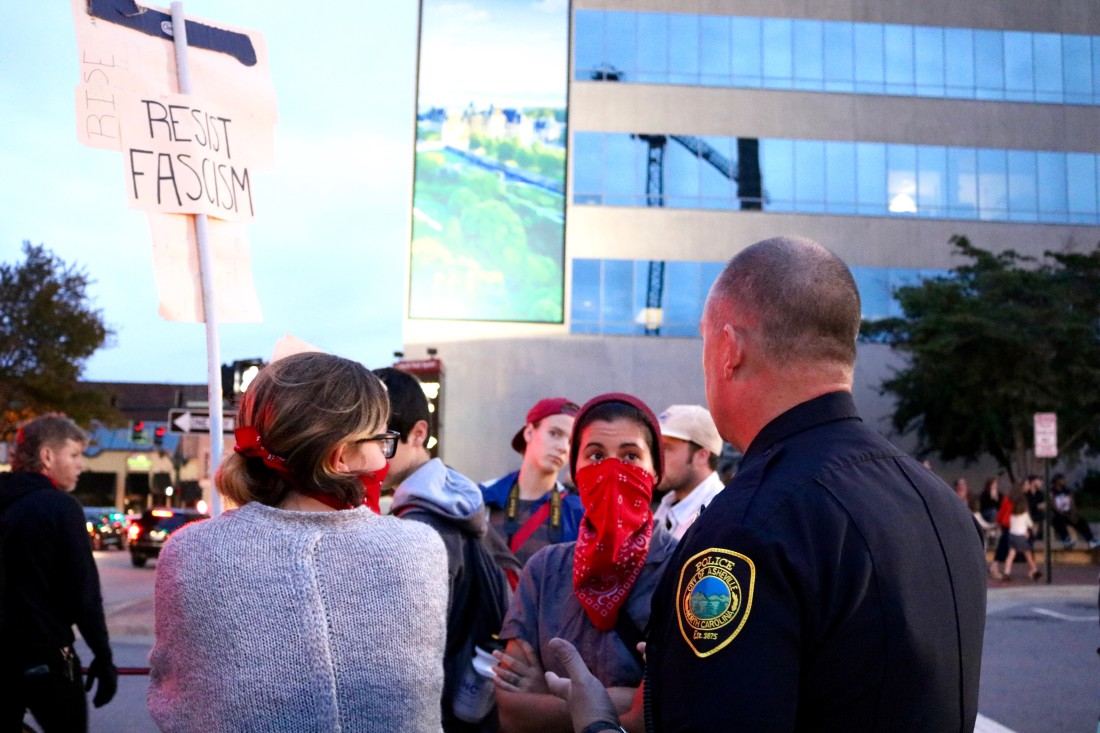

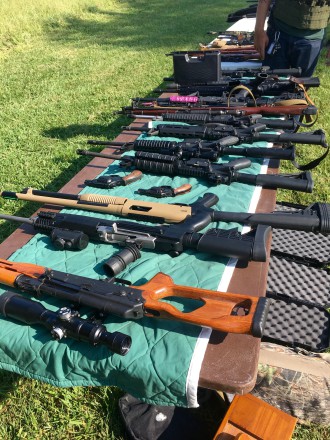

Thanks Max for pulling together this interesting, important piece. I continue to be amazed at how democracy reinvents itself.
Thank you for reading, Amy! I agree that we’re witnessing a pretty interesting turning point in our political evolution in this country.
Good article, Max. I think an equally interesting topic would be an article on moderates (I say that genuinely). Both the far Right and far Left turn heads with their views, but right now I think the non-flashy middle is a rapidly vacating political space and is one of a democratic society’s great stabilizing segments that is right now tremendously (and quietly) at risk.
Thanks for reading, Tom! I think you make a very valid and interesting point. This is a topic we’ve also considered here at Xpress as well. Stay tuned to further coverage!
The extreme center are total hypocrites for promulgating the lie that they are somehow less ideological or more rational than others. One thing both left and right can easily agree on is the total hypocrisy and corruption of the “center” which is also what Russians could see in Trump, and the brexit voters could see in the EU. The wings are winning due to common ground on centrist corruption, hypocrisy and elitism! The people are through being pushed around by centrist elite billionaires like Gates, Soros and Buffett! plus local elite ZONERS conspiring to cause homelessness and sprawl!
My bad.
TPP, NAFTA and single family zoning, as well as Brexit are also areas where populist wingers on both wings opposed the elite hypocritical and corrupt “centrist” establishment; not so much together, but more in parallel. such parallel populist efforts involving both wings have been the winning political formula of the last decade; and I am proud to coordinate with activists on both wings in the interest of antielite populism; though both wings often think I am on the other, especially the antipopulist, new McCarthyite, countertriangulating Clintonoids.
Does this editorial achieve it’s perceived goal of re-humanizing extreme parties that the extremist work so hard to dehumanize and promote division? I think not.
When you read the quote from the “antifa” person paraphrased as – we kill less people than the extreme on the other side; the contradiction is fairly obvious.
In other words, we are not really non-violent and are promoters of more lofty positions, is more of the same ole “do as I say not as I do” rhetoric that will always fall on its on sword.
It is only when each of us treats another as a human being worthy of the right to speak that we can hope for peace in a community. If we lead with, “you must not be decent, you are full of hate, you do not care about life, we can simply look in the mirror and see what is coming our way.
How about we just listen for a change and compete on the field of ideas?